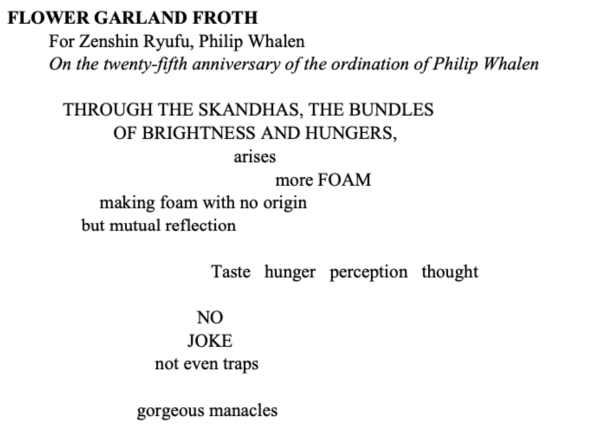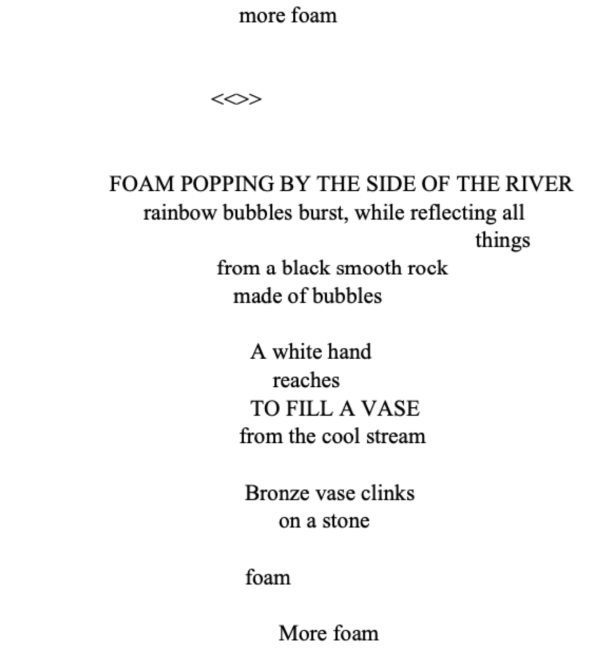Beat Breath
Projective Verse, Allen Ginsberg, Michael McClure and the Transformative Power of a Breathing Practice on Poetry
How does conscious breathing inform Beat Literature?
How did Projective Verse influence Beat poetry, especially in Michael McClure’s work (especially, Touching The Edge: Dharma Devotions from the Hummingbird Sangha and Mule Kick Blues) the implications for this work as related to Zen and as a model as a Post-Beat, bioregional (place-based) poetics/cosmology.
The Beats were Zen influenced from very early on in their association via their interest in Buddhism. Kerouac’s The Scripture of the Golden Eternity was written after a challenge by Gary Snyder for Kerouac when he said: “…it’s about time for you to write a sutra.” Michael McClure has called Mexico City Blues Kerouac’s “masterpiece… a religious poem startling in its majesty and comedy and gentleness and vision.” That Kerouac wrote he wanted to be considered a “jazz poet blowing a long blues” is an early declaration of that Beat Breath again.
As far as Ginsberg goes, his description of his own work as “Hebraic, Melvillian, Bardic Breath” could be unpacked as its own essay subject, but the Jewish Cantor tradition, combined with the notion of the Bard (which would largely be a Blakean influence) mixed in with some Walt Whitman and Buddhism are huge influences. Allen told Andrew Schelling about the superficial source of his own breath at a post-Naropa Institute party. (See October 11, 2021 video, 2:00-4:48.)
Breath, watching the breath, being aware of one’s breath, being committed to ahimsa (doing no harm) are all aspects of basic Buddhism and Allen Ginsberg, Gary Synder, Joanne Kyger, Diane di Prima and Michael McClure (among the Beats) were serious practitioners of zazen and study of Buddhist texts. To be here and now is critical and we’ll cover that and the intersection of breath and poetry in McClure’s later work, but it is clear that the main power source behind the Beats was Buddhism.
Tetsuzen Jason Wirth on breath in kabbalah, zen breath & ahimsa:
Breath in Projective Verse



McClure on Projective Verse: (Play clip or transcript:)
These three poems are unchanged. They’re spontaneous, and they are as they were written, and each one is a kind of a spiritual challenge and part of the adventure of the consciousness that’s taking place there is I may not change it. I mean, I do not allow myself to change it. And that doesn’t mean that it’s a grueling or excoriating task that I’ve laid upon myself but a very sweet possibility of taking a trip through experience that I’ve never taken before. Now, the poem does not really necessarily come from me. With projective verse, the inspiration for the poem can be outside of you, or it could be inside of you. It could be a perception or an act, or a memory, or a piece of consciousness. But it could also be — let’s say it was a vase of incredibly beautiful irises. Then I look at that vase of irises and/or touch it or I smell it. It’s not just looking at it. I’m aware. I have the perception in the real world of that vase of irises. It becomes part of me, of my physical being, and then it sort of like rebounds, following my breath line onto the page and is arranged on the page in terms of my breath line, and what I’m really listening to as I write it, it’s not metrical foot like, light/ heavy, light/heavy, light/heavy, or any given count, but I’m listening to syllables as it happens. So you see, it’s less like I’m dragging something up out of myself than it is like I’m acting in the world…
Jason on Dõgen, the concept of breath/body/here/now and McClure’s deep understanding of Dõgen as demonstrated in the poem “Flower Garland Froth.”



Conclusion: The Beat/Black Mountain school of poetry is the last major North American avant-garde movement that understood the importance of breath, embodiment, now & here and that led them (early) to eco-poetics, place and spontaneous poetics which allowed them to be tapped into the prophetic and give us an enduring roadmap/tools for working for bioregional reinhabitation and an Rx for the troubled biosphere.


Dear Paul and Jason,
Just wanted to thank you both, so much, for the wonderfully insightful talk you both gave yesterday (last night for me here in Tokyo, Japan) on the importance of breath in McClure’s work, Ginsberg’s work and in poetry in general. I’ve been a fan of McClure’s work myself, reading him constantly for the past 10 years or so, so I thoroughly enjoyed your presentation and learned much from that. Thank you so much. I hope there will be even more research on McClure’s body of work in future……